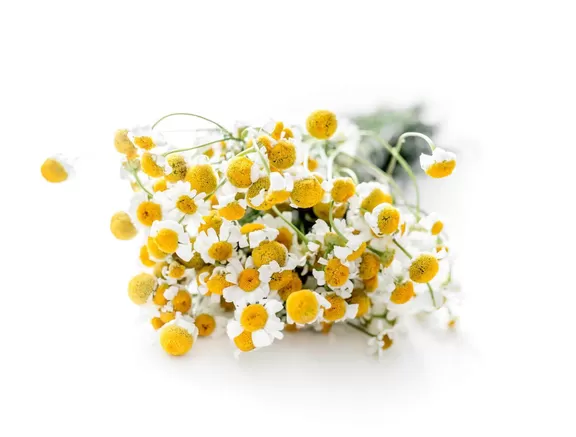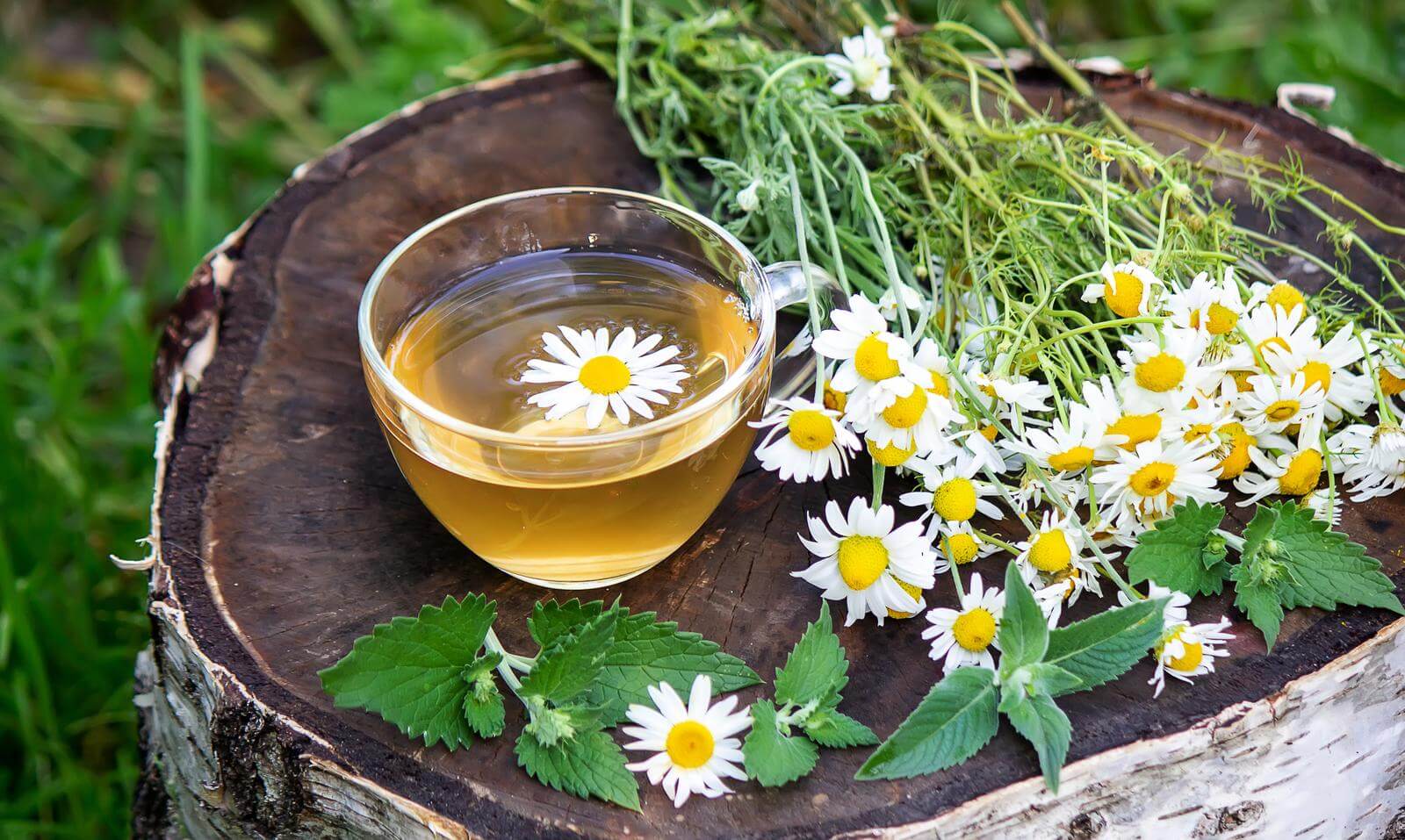
Chamomile, or more specifically chamomile tea, seems to be purported as a remedy for constipation. The theory is that chamomile will help relax the muscles in the intestines thus helping the contents flow out. But, the evidence appears to not really support this idea.
The muscles that move the food you eat through the intestines are smooth muscles. Smooth muscle in the intestinal wall cause contractions that move the bolus of food down the gastrointestinal tract.(source 1)
And, it is known that chamomile is able to relax smooth muscle; as research we will discuss will show. But, drugs that relax smooth muscles have shown no significant ability to reduce constipation—we will discuss this specifically later on in the article. Therefore there appears to be no basis to substantiate the claim that smooth muscle relaxants, like chamomile, will help with constipation. Although it sounds plausible; therefore, this may be the reason chamomile tea is purported as a remedy for constipation.
Another thing to consider is that chamomile contains a good amount of tannins. And, tannins are contraindicated (not suggested to be used in a situation) for constipation. Therefore, the tannins in chamomile will counteract any chemical elements in the herb that help with constipation.
Additionally, chamomile is a good therapy for the opposite of constipation: diarrhea. One study on rats found the antidiarrheal drug loperamide (used to help with the symptoms of acute diarrhea; brand name: Diamode) did not stop constipation as well as the highest concentration of chamomile (Matricaria recutita L.) extract.
Topical application of chamomile essential oil to the abdomen may be beneficial. One study found that applying chamomile oil topically to the abdomen helped postoperative women (who underwent cesarean sections) were able to have a bowel movement sooner.
Because this application method may allow the phytochemicals (plant chemicals) to relax smooth muscles, without the ingestion of tannins, this may help with constipation.
But, concerning ingesting chamomile, it's what you want to do if you have diarrhea, not constipation. Try keeping chamomile to topical applications directly to the abdomen; additionally, light massage of this area may encourage defecation.
In conclusion, it appears there is only a little evidence to support the hypothesis that chamomile is a good herbal treatment for constipation. The majority of the evidence suggests that it is not going to help with constipation. It may be that getting plenty of water by drinking chamomile tea is the only reason this home remedy works! A lot of hot tea water is probably a great way to ease constipation!
It is likely that the conclusion that chamomile tea helps with constipation is spurious; as the consumption of a lot of hot water may be the real reason this home remedy might work.
Different Species of Chamomile
Before we go further, for protocol’s sake, it should be noted there are two kinds of chamomile: German chamomile (Matricaria chamomilla / Matricaria recutita) and Roman chamomile (Chamaemelum nobile). This article will not make a distinction between these two, and simply refer to both species as chamomile; except when specifically defined as we go through certain studies.
Samuel Bart’s Digestive Health Solution
Samuel Bart has always been passionate about plants and their ability to keep us healthy. He has put together some of the best natural ways that could help anyone support a healthy digestive system.
Samuel perfected an easy, yet powerful formula, which consists of amazing ingredients. Bart’s supplement is backed by a ironclad 60-day, money back guarantee.

A Study Supporting Chamomile for Constipation
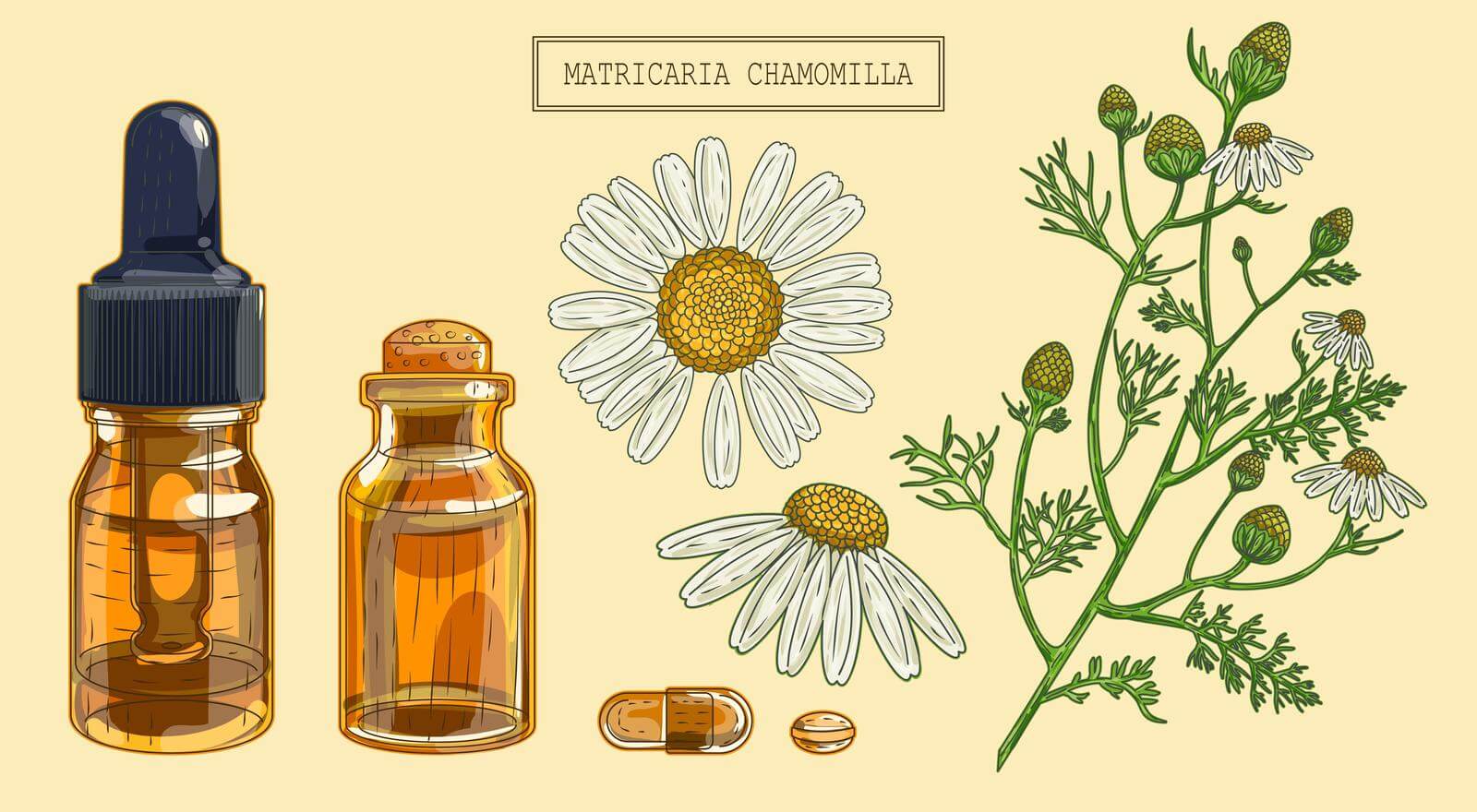
A 2018 study in the Journal of Research in Pharmacy Practice(source 2) was conducted on postoperative women who had a cesarean section to see how topical chamomile essential oil would affect their bowel function. Postoperative ileus (POI) is a common complication after surgery.
According to the U.S. National Library of Medicine’s StatPearls article(source 3): "[POI] is a prolonged absence of bowel function after surgical procedures, usually abdominal surgery." The article goes on to say POI is a common problem after surgery with an unclear causation and how it causes disordered physiological processes. POI is a benign condition that typically goes away with minimal intervention.
The study encompassed 142 women who were about to give birth and divided them approximately equally into three groups:
- Intervention group - receiving chamomile essential oil applied topically to the abdomen after the patient was stable.
- Placebo group - given a placebo oil in the same manner as the intervention group.
- Control group - no intervention (or placebo) was given to this group.
The time frame results for first passing a stool:
- Chamomile oil group: 27.6 hours
- Placebo group: 30.2 hours
- Control group: 34.5 hours
The time frame results for first bowel sound were:
- Chamomile oil group: 11.1 hours
- Placebo group: 18.2 hours
- Control group: 19.6 hours
The study found the following time frame results for time to flatulence:
- Chamomile oil group: 20.9 hours
- Placebo group: 27.7 hours
- Control group: 28.1 hours

Comprehensive Herbalist School
Dr. Patrick Jones, founder of the HomeGrown Herbalist School of Botanical Medicine has been a practicing veterinarian for over 25 years. He is also a clinical herbalist and traditional naturopath.
Kevin Harrington, Original Shark from ABC’s Shark Tank, stands behind Dr. Patrick Jones and HomeGrown Herbalist.
Learn More
Comprehensive Herbalist School
Dr. Patrick Jones, founder of the HomeGrown Herbalist School of Botanical Medicine has been a practicing veterinarian for over 25 years. He is also a clinical herbalist and traditional naturopath.
Kevin Harrington, Original Shark from ABC’s Shark Tank, stands behind Dr. Patrick Jones and HomeGrown Herbalist.Learn More
The study found that the times to first flatulence was significantly shorter in the chamomile (intervention) group than in the placebo or control groups. Also, time to first bowel sound was shorter in the chamomile group than in the other two groups.
Possibly most importantly, the time from surgery to the first passing of a stool was shorter in the chamomile group than in the placebo or control groups.
The study concluded that topical chamomile oil has the potential to have a beneficial effect on gastrointestinal motility (the movement of foodstuff through the gastrointestinal canal) and can reduce the length of POI.
Guaranteed 24 Hour Constipation Relief
Dr. Scott McLeod, PharmD received his doctorate from the WSU College of Pharmacy. His book on constipation is guaranteed to show you how to get relief in 24 hours or less-or your money back (60 day, 100% refund guarantee).
Everything used in this plan is from nature. No use of harmful laxatives. People who have used these say they work BETTER than over-the-counter laxatives!

Chamomile Helps with Diarrhea
A 2014 study in the Journal of Ethnopharmacology(source 4) performed a study on how a chamomile extract would affect castor oil induced diarrhea in rats.
The study used a decoction extract made from Chamomile (Matricaria recutita L.) flowers. The plant material was dried and ground into a powder and extracted with distilled water.
The rats were given doses ranging between 12.5 mg/kg and 3200 mg/kg of chamomile extract after diarrhea was induced.
The study found that 4 hours after the administration of castor oil all the rats produced large amounts of diarrhea. Pre-treatment with chamomile extract at 25, 50 and 100 mg/kg significantly reduced the number of defecations.
Rats given loperamide (a drug used to help with the symptoms of acute diarrhea; brand name: Diamode) at a dose of 20 mg/kg produced an antidiarrheal effect as well. Yet, the effect of loperamide was less than the high dose of chamomile extract.
The study concluded by stating:
In conclusion, our data clearly demonstrated the protective effects of [chamomile decoction extract] against castor oil-induced diarrhea and fluid accumulation in rats as well as the implication of oxidative stress and Fenton pathway in such protection. These findings confirmed the basis for the use of chamomile extracts in traditional medicine for the treatment and/or management of digestive system disorders as diarrhea.
Journal of Ethnopharmacology [152.2 (2014): 327-332]
Thus, it appears that chamomile functions more to stop digestive transit than to encourage it.
Naturally Treat Hemorrhoids in 48 Hours
Jessica Wright’s unique 5-step, all-natural approach to hemorrhoid treatment delivers permanent relief. Heal hemorrhoids in 48 hours, and eliminate the root cause in 30 to 60 days.
Benefit from Jessica’s 12 years of research; her book is backed by a 60 day, 100% money back guarantee.

Tannins in Chamomile may Aggravate Constipation

Tannins are ubiquitous chemicals, and consist of a specific group of polyphenols. They are found in many plants. Tannins act on the sensory organs to produce astringency and bitterness. Because of their significance to food chemistry, the food industry, and human nutrition, there is a lot of research conducted on tannins.(source 10)
A 2015 study in the General Physiology and Biophysics(source 5) determined the chemical composition of chamomile (Matricaria recutita L.). One aspect of the composition was the amount of tannins (expressed as mg of catechin equivalents) in chamomile. This study reports there were 1.74 mg of tannins per gram of dry weight.
A 2014 study in Pediatric Gastroenterology, Hepatology & Nutrition(source 6) makes it clear that tannins are not good to take for constipated children. The study states that tannin acid (tannins are commonly referred to as tannic acid(source 7)) reduces small intestinal secretions and inhibits peristalsis (peristalsis is the term for the involuntary constriction and relaxation of a canal—in this case the intestinal canal—which causes a wave like movement that push the contents of the canal through it).
The study also discussed bananas and suggested not feeding a banana to a constipated child. This is because of the tannin content. Unripe bananas contain 100 mg to 250 mg of tannins per 100 g. And, as bananas ripen, the quantity of tannins decreases. So even ripened bananas, with lower tannin content wouldn’t be a suitable food for constipated children according to this study.
And, since chamomile contains 1.74 mg of tannins per gram of dry weight, 100 g would contain approximately 174 mg of tannins. This is similar to those found in unripe bananas. Thus, it would seem that the tannin content of chamomile would suggest it is not the best herb for constipation.
A 2019 study in the Jornal de Pediatria(source 7) also discussed constipation in children. This study states:
Eating large amounts of tannins can induce constipation and stomach pain, since these plant-based compounds affect the gut mucosa and prevent relaxation of the digestive tract muscles.
Jornal de Pediatria [95 (2019): 1-3]
Dr. John Herzog (MD)
Dr. John Herzog, a "survival surgeon" from Maine explains what home remedies work best in a crisis situation.
This may be important in the event you require first-aid or are in an emergency situation without easy access to a hospital. Dr. John Herzog has assembled a large collection of home remedies for such scenarios.

Chamomile is a Muscle Relaxant
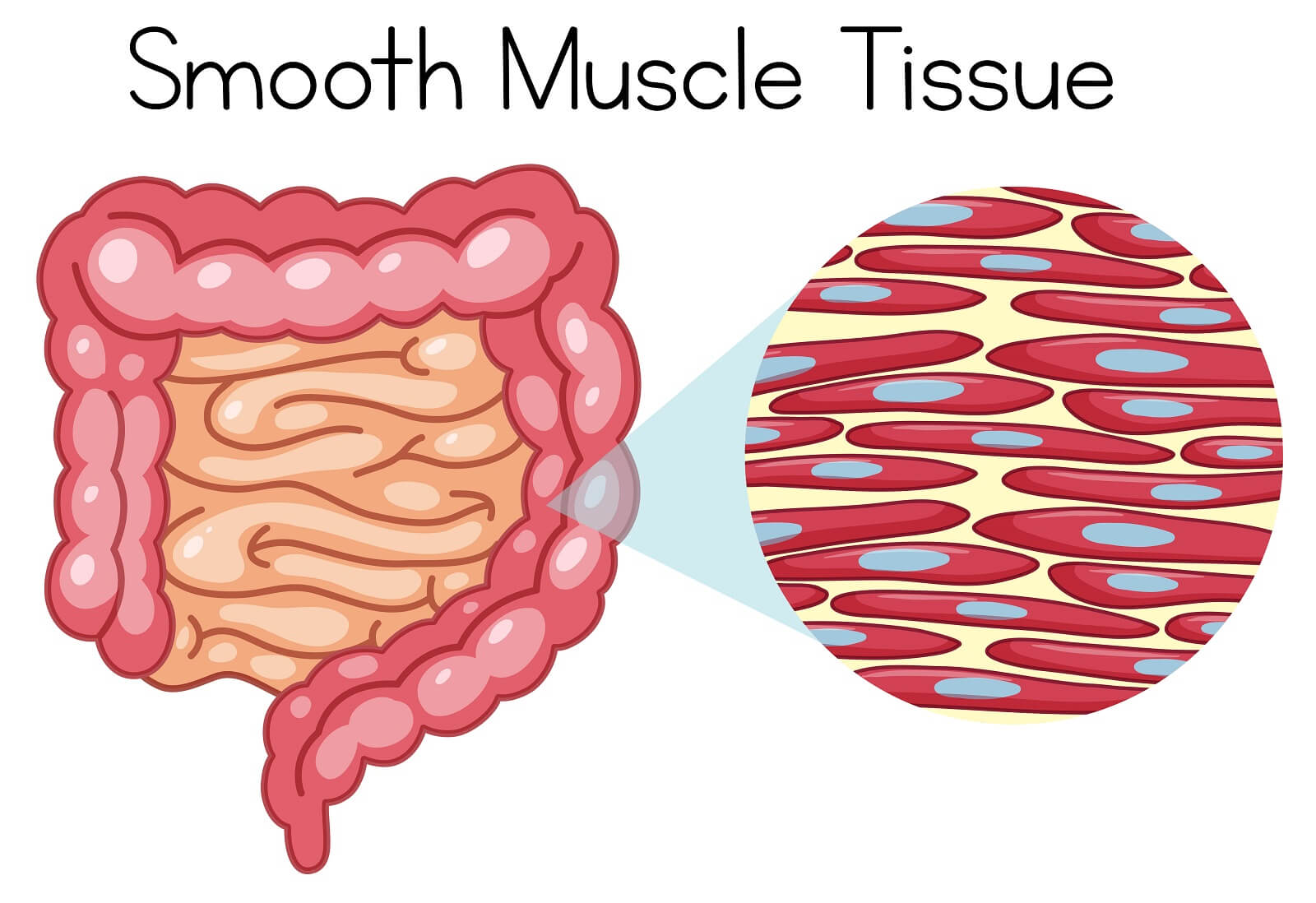
A 2018 study in Frontiers in Pharmacology(source 8) focused on how Roman chamomile (Chamaemelum nobile) would act as a smooth muscle relaxant. The study used a water/alcohol extract of this herb for its experiments, and also tested the essential oil and 4 flavonoids (apigenin, eupafolin, hispidulin, and luteolin) on smooth muscles.
The study used Roman chamomile flowers to prepare their extracts. 70% ethanol (drinking alcohol) was used to make the extract.
Other chemical processing was then performed on this extract to separate other chemical fractions. This processing was done via elution (the process of extracting one material from another by washing with a solvent) with methanol (the chemically simplest alcohol) and water.
Methanol / water ratios of 20:80, 40:60, 60:40, 80:20, 100:0 were used to gain fractions from the crude extract and referred to as follows: F20, F40, F60, F80, and F100.
The F100 fraction yielded the following flavonoids:
- Luteolin: approx. 55.3 mg/g
- Eupafolin: approx. 150.2 mg/g
- Apigenin: approx. 2.05 mg/g
- Hispidulin: approx. 4.98 mg/g

The study contracted guinea pig ileum (the ileum is the third portion of the small intestine, between the jejunum and the cecum) artificially with histamine and added the roman chamomile preparations to it to determine the relaxing effects they would have.
The crude water/alcohol extract induced a concentration dependent relaxing effect on the guinea pig ileum. The highest concentration that was tested (which was 200 mcg/mL; i.e., 200 micrograms per milliliter) caused a full relaxation.
Concerning the flavonoids, F20 and F40 did not produce much relaxing effects. Yet F80 and F100 had powerful relaxation abilities. F80 at a concentration of 60 mcg/mL produced approximately 93% relaxation. F100 at a concentration of 60 mcg/mL produced approximately 69.4% relaxation. Both F80 and F100 at 200 mcg/mL concentrations produced 100% relaxation.

HomeGrown Herbalist Herb Shoppe
Owner of HomeGrown Herbalist Dr. Patrick Jones is a practicing veterinarian, Clinical Herbalist, and traditional naturopath. He owns and operates Fairview Animal Hospital in Buhl, ID.
Their herb shoppe provides herbs, essential oils, and tools. If you have some time, check it out!
Learn More
HomeGrown Herbalist Herb Shoppe
Owner of HomeGrown Herbalist Dr. Patrick Jones is a practicing veterinarian, Clinical Herbalist, and traditional naturopath. He owns and operates Fairview Animal Hospital in Buhl, ID.
Their herb shoppe provides herbs, essential oils, and tools. If you have some time, check it out!Learn More
Concerning the essential oil of Roman chamomile, it also produced a relaxing effect. 1 mcg/mL induced approximately 30.8% relaxation. A concentration of 10 mcg/mL of the oil produced approximately 69.7% relaxation.
The study stated that the extract appeared to cause its effect by influencing the smooth muscle itself. Quoting this study: "Based on these data we propose that the site of action for the relaxant effect of RC is on the smooth muscle itself."
Smooth Muscle Relaxants & Constipation
A 2001 review study in Alimentary Pharmacology & Therapeutics(source 9) was conducted to evaluate studies of placebo controlled double-blind trials on smooth muscle relaxants used for irritable bowel syndrome. In this review study, how smooth muscle relaxers influenced constipation was assessed.
The review found 4 trials (a total of 490 patients) that reported results concerning constipation. There was no significant difference in constipation for those taking smooth muscle relaxants. The average odds ratio was 0.89 (an odds ratio of less than one demonstrates less of a risk for an event; in this case a 11% less risk).
Concerning gastrointestinal tract transit (the movement of digesting food through the intestines), the review also found that 4 of the investigated studies (with a total of 230 patients) reported transit results. These 4 studies showed no significant difference in intestinal transit. The average odds ratio was 1.04.
Therefore it appears that the smooth muscle relaxation induced by chamomile will not impart any anti-constipation benefit.
Claire Goodall’s Amazing Guide
Clair Goodall is a bee-obsessed, natural medicine convert from Minnesota (USA). And, she does keep bees!
Clair has created 350+ page book documenting how to replace the toxic products and medications in your home with healthier, all-natural alternatives.

Side Effects of Chamomile
Common types of German and Roman chamomile flowers have the U.S. FDA’s generally recognized as safe (GRAS) status. Yet, there are some complications that can arise from chamomile to be aware of.
Chamomile might be able to induce labor by affecting the uterine muscles. And, chamomile may cause drug interactions with certain medications—such as the blood thinner warfarin. So, chamomile’s side effects and contraindications are more than just related to allergic reactions!
Herbsey has an entire article on the side effects of chamomile that also lists dosage guidelines. If you want to know how much chamomile to take, and situations where it probably isn’t safe, check out this article: Side Effects & Dosage Guidelines for Chamomile.
A Natural Digestive System Supplement that Helps
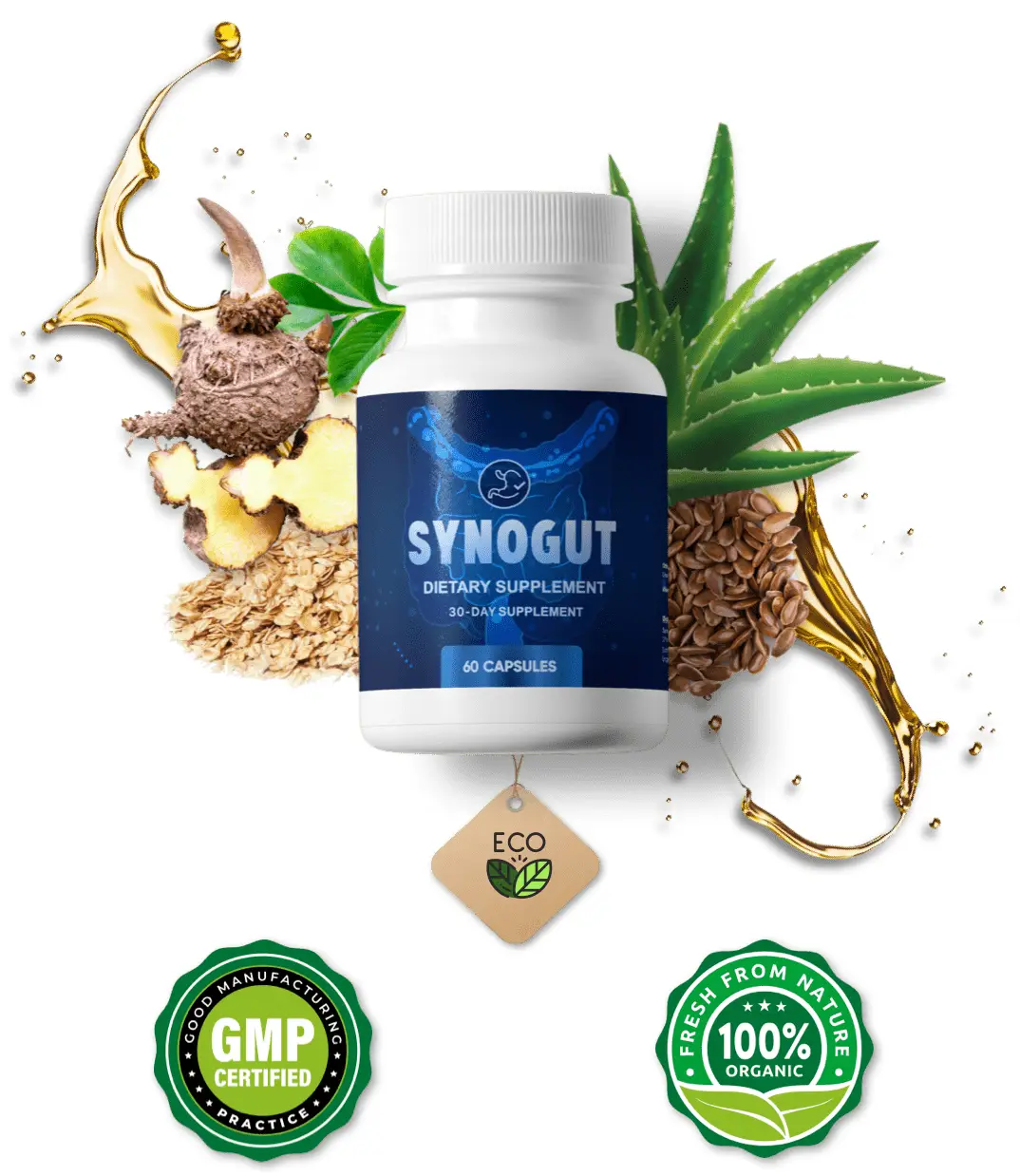
If you have been struggling with digestive problems like constipation, you should know about Samuel Bart. Mr. Bart lives with his wife, Alma, in Nashville, Tennessee.
Mr. Bart has always had a passion for plants and how to use them medicinally. He went on to research some of the most effective ways that could help people support a healthy digestive system.
To this end, Mr. Bart developed a product he calls “SynoGut.”
Every capsule of this supplement is made in the USA, in a FDA approved, and GMP certified, facility under sterile, strict, and precise standards. Synogut capsules are non-GMO. You can rest assured that they do not contain any dangerous stimulants or toxins, and more importantly, they are not habit forming.
His proprietary blend blend contains the following ingredients:
- Psyllium husk
- Bentonite clay
- Black walnut hull
- Oat bran
- Flaxseed
- Prune fruit
- Aloe vera leaf
- Lactobacillus acidophilus (a probiotic bacteria)
- Apple fruit pectin
- Glucomannan root
If this is not the first time you have had constipation, you might benefit from the power these natural items can provide. And, if you have had prolonged constipation, utilizing a supplement like Mr. Bart’s could help you become more regular—without an arsenal of prescription drugs.
Many people have tried synthetic drugs to solve their constipation issues; and if these didn’t work, it may be hard to invest in a natural remedy like SynoGut. To this end, Mr. Bart offers a 60 day, full refund guarantee on his supplement.
If you decide to invest in Mr. Bart’s supplement, and are not satisfied with the results, you can quickly request a refund. SynoGut will promptly refund your purchase; ensuring there is no risk to give Mr. Bart a chance.
SynoGut is sold via the large online retailer ClickBank—a company based in Boise Idaho, USA. ClickBank sells products across the world, and ensures you can get a refund if you are not satisfied with SynoGut’s results.
If you are in a situation where you have “tried everything,” SynoGut is worth the quick purchase and a solid test drive. If you would like to learn more about Samuel Bart’s SynoGut supplement, you can do so at the SynoGut website.
About the Author
Geoff Kent is a natural medicine enthusiast who has been researching and writing about natural medicine since 2008. Geoff is primarily a web developer, but also researches and authors written and video content about natural health. Geoff has a bachelor’s degree in Management Information Systems from the University of Northern Iowa.
More on Geoff KentImportant Disclosures & Disclaimers
It is important to use the information you find on Herbsey.com in the right way. Also for legal reasons, these disclaimers and disclosures are necessary. For further information about each, feel free to click the link provided to the page on this website that provides more information.
Medical Disclaimer
The information on this website is not a prescription for anyone. This information is for informational or educational purposes only, and is not a substitute for professional medical advice or consultations with healthcare professionals.
Advertisement Disclosure
Some of the links provided on this article and website are affiliate links. If you purchase a product after clicking on these links, Herbsey.com will earn a commission. Herbsey.com promotes various products through advertisement and text links. For more information: Our Advertisements.








